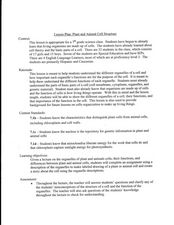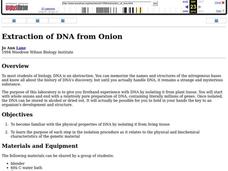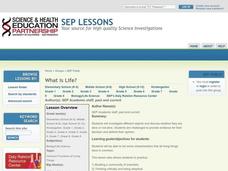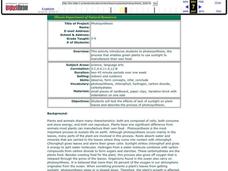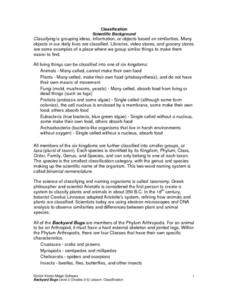Curated OER
Reviving Celery
The classic in-class demonstration using celery dipped into water with food coloring is the highlight of this biology lesson plan. Young scientists discover that organisms are made up cells and have distinguishing characteristics. After...
Curated OER
Classification/Taxonomy/Statistics Review
"Does King Phillip Cry Over Flimsy Grass Stems?" You might not answer that question with this exhaustive worksheet, but your biology class will get the full scoop on the hierarchy of biological classification with this resource. It...
Curated OER
Characteristics of Plants
In this characteristics of plants worksheet, students name two things that all plants have in common. Then they describe how the cell walls and cuticles help plants adapt to life on land. Students also explain the difference between...
Curated OER
Genetics and Heredity: The Next Generation
Tenth graders work in teams to order events of DNA transcription and translation protein synthesis. In the second lesson, they put the steps of mitosis and meiosis in order using a concept map poster. They use modeling clay to create...
K12 Reader
Tissues, Organs and Systems
Young scientists are introduced to the connections among cells, tissues, organs, and systems in a life science reading comprehension learning exercise that asks them to respond to a series of questions based on the passage.
Curated OER
Plant and Animal Cell Structure
Seventh graders identify the different parts and functions of the cell. In this biology lesson, 7th graders make a labelled diagram of either a plant or animal cell. They write a story about it.
Curated OER
Genetic Analysis
Young scholars formulate a hypothesis regarding the validity of the current status of the Arizona Hedgehog cactus as a distinct variety of cactus. They design a procedure to isolate DNA from the tissue of plants, given a list of...
Curated OER
What Does Life Look Like Under a Microscope?
Learners discover cells make up all living things. In this life science lesson, students investigate living organisms and the cells that create them. Finally the learners create a testable question, conduct an investigation, and draw...
Curated OER
Survey of the Plant Kingdom
In this plant kingdom worksheet, students will review the characteristics of the 12 divisions of the plant kingdom, comparing and contrasting their structures and life cycles. This worksheet has 17 matching, 5 short answer, and 5 fill in...
Curated OER
Life Cycle: Diversity in a Balance 4th Grade Workbook
In this life cycle workbook, 5th graders examine plant and animal cells, classification of organisms, human biology, photosynthesis, and natural environments. 21 different activities make up the Life Cycle Workbook.
Curated OER
Living or Non-Living
Students examine living and non-living things. In this life science activity, students are given a group of objects and discuss if they are living or non-living. Students identify and list characteristics of living things.
Curated OER
Design a Plankton
Students explore animal and plant adaptation. In this ecosystems science lesson, students view websites to gain information about plankton and its interdependence within ecosystems. Students identify ways in which plankton has adapted...
Curated OER
Eukaryotes vs. Prokaryotes
Seven simple slides list characteristics of eukaryotic and prokaryotic cells. After viewing this presentation, future biologists will be also able to name the unique characteristics of plant, animal, and fungal cells. Ideally, you would...
Curated OER
The Five Kingdoms
An overview of the five kingdoms within the biological classification system is presented in this set of five slides. The first lists the objectives of the slide show, and the second gives general characteristics of plant, animal, and...
Curated OER
Kingdom: Fungi
The general characteristics that affect classification of fungi and other organisms in the domain Eukarya are detailed for the students on 12 attractive slides. Teachers can access individual slides to cover life cycles or diversity, or...
Curated OER
Plant Pigments
Students investigate the components of chlorophyll. They use paper chromatography to separate the many pigments of chlorophyll from one another.
Curated OER
Fungi
Lovely pictures help to summarize the different characteristics of fungi in this PowerPoint which covers structure, function and the way that fungi get nutrients. Symbiotic relationships are examined, and some commercial uses are given.
Curated OER
Fungi
The general characteristics that affect the classification of fungi and other organisms in the domain Eukarya are detailed on 12 attractive slides. Teachers can access individual slides to cover life cycles or diversity, or can use the...
Curated OER
Extraction of DNA from Onion
Students experiment with DNA by isolating it from plant tissue. They investigate whole onions to prepare DNA. They complete the experiment to examine the structural characteristics of DNA.
Curated OER
What is Life?
Students investigate the characteristics of living things. In this life science lesson, students examine several living and non-living specimens. Students determine which things are living and non-living.
Curated OER
Plant Life Cycle
Fourth graders explore the plant life cycle. They discuss the sequence of events in the life cycle of the plant and illustrate how the life cycle never ends. Students explore the importance of water, sunlight, and nutrients during the...
Curated OER
Photosynthesis
Students are introduced to the process of photosynthesis. In groups, they test the effects of the lack of sunlight on plant leaves and compare the results with their hypothesis. They note the characteristics that plants and animals share...
Curated OER
Backyard Bugs
Explore the concept of scientific classification and the similarities and differences between plant and animal species. Your class will participate in hands-on activities by investigating dichotomous keys and classifying their shoes. To...
Curated OER
Cloning a Living Organism
It's the attack of the clones! Not to worry; these are just plant clones. Teen horticulturalists will enjoy growing their own clone into a plant in an activity designed to be revisited after a few weeks. It is one experiment that kids...







